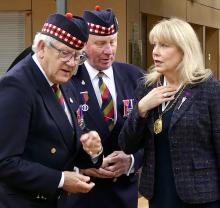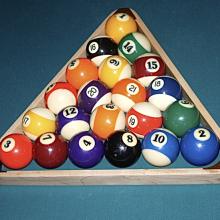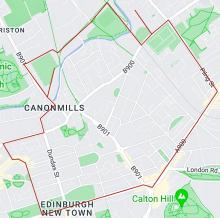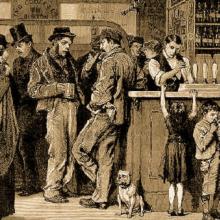
EDINBURGH DRINKING CLUBS.
POLICE START NEW CAMPAIGN.
A new phase in the drinking club question as regards Edinburgh has been entered upon.[1] As has been stated, the decisions on the subject in the High Court of Justiciary led to a great revival of those institutions in the city, but the assumption held by those who are running them that the decisions guard them effectively against any further attack is apparently not shared by the police, who, with almost startling suddenness, have again swooped down upon them, and inaugurated a completely fresh campaign for their extermination.
On a recent Sunday a constable in plain clothes went round a number of the clubs, getting, it is stated, drinks where he could, and the result was seen in the Police Court to-day, when five prosecutions were entered upon.
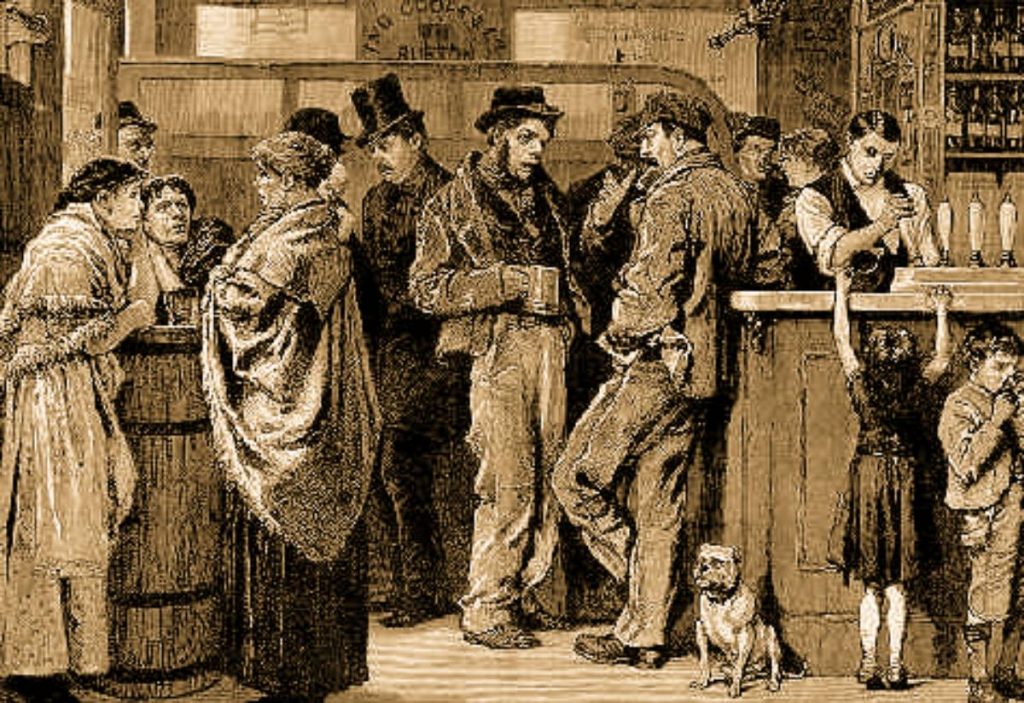
The first case called was that of Francis Rynn, living in Cowgate, and Lewis Mann, living in Jeffrey Street, who were charged with having, on the 28th September last in the premises at 2 Hyndford’s Close, known as the St David’s Social Club, trafficked in excisable liquor without a license—Ryan by selling two glasses of whisky and one pint of beer to John Gannon, and Mann by selling one glass of whisky, two “nips” of port wine, and two pints of beer to Gannon. They pleaded not guilty, and the case was adjourned for trial on Saturday.
John Learmonth, living in James’ Square, and Albert Burns, living in Gilchrist’s Entry, were next charged with having, on the 28th September last, in the premises at 1 Bellevue Road, known as the Criterion Club, trafficked in exciseable liquor, Learmonth by selling two glasses of whisky and one pint of beer, and Burns by selling two gills of whisky to John Gannon. A plea of not guilty having been tendered, Monday was fixed for the trial.
Peter Cockburn. High Street, and George Dickson, Pleasance, pleaded not guilty to having sold six pints of beer to Gannon in the premises at Canongate, known as the Richmond Athletic Club, on the 28th ult. The trial was fixed for Saturday next.
Frank M’Nally was charged with having on the 21st ult. in the Criterion Club, sold two glasses of rum and two pints of beer to James M’Farlane. He pleaded not guilty, and the case was continued for trial on Tuesday.
John Taylor, living in St Patrick Square, and James M’Gindle, living in Grassmarket, pleaded not guilty to having, on the 28th September, in the premises at 5 Infirmary Street, known as the Gaiety Social Club, trafficked in exciseable liquor, Taylor by selling four glasses of whisky and three pints of beer, and M’Gindle by selling a glass of whisky and two pints of beer to John Gannon. Monday was fixed for the hearing of this case. Several other prosecutions are pending.
Edinburgh Evening News, 9 October 1902[2]
[1] Objections to drinking clubs centred upon: general overprovision of alcohol; unrestricted opening hours (after 10pm and on Sundays when pubs closed); sales to non-members; nominal membership fees; sales to children; sales of alcohol and tobacco without a licence; drunkenness on the streets; and disorder. ‘In the past year the number of persons reported, or arrested, for breaches of the law in connection with the licensing question totalled 216, as against 23 last year. Of that number, 112 only had been convicted, 18 cases were dismissed as not proven, and 54 were not proceeded with, because of want of power to deal with them’ (EEN, 7.1.02). On 19 March 1902 the Court of Justiciary upheld the clubs’ right to operate until and unless the law was changed. EEN deplored the government’s failure to act, alleging that it feared doing so would hamper political clubs. The newspaper argued: ‘The drinking clubs are morally degrading to the lower and thriftless section of the working classes, affecting many helpless people, and the Legislature must be stirred up to check the growth of these organised shebeens, and so guard the thoughtless and their dependents’ (20.3.02). M-LJ (6.1.05) reported how ‘In his report on the work of the East End Wesleyan Mission, the Rev. Peter Thompson refers to the excessive number of public-houses in St George’s, and says that one morning in a street containing only 100 houses were found 27 women with black eyes.’ For chapter and verse on alcohol consumption during this period, see Thora Hands (2018), Drinking in Victorian and Edwardian Britain (Cham: Palgrave MacMillan), last accessed 11.12.20.
[2] Image: Creative commons, via Brewinmate, last accessed 16.12.20.
*****
GIRL, feeder-in or willing to learn.[3] Deas, lithographers, 55 Thistle Street Lane.
Edinburgh Evening News, 10 October 1901
[3] A feeder-in fed blank paper into the printing press.
*****
Domestic economy. Free classes
for females over 15 years.
The Town Council has arranged to give FREE CLASSES from now: (1) Cookery, (2) Laundry Work, (3) Cutting-Out and Making of Underclothing and Children’s Frocks, (4) Home Dress Cutting, Fitting, and Making.
The CLASSES will be HELD AT INDIA BUILDINGS, Victoria Street, and at 3 ATHOLLL CRESCENT LANE.
Managers of Mothers’ Meetings, Girls’ Clubs, &c., may apply for DEMONSTRATION LESSONS on Artisan Cookery, Lectures on Home Sick Nursing, and Simple Health Lectures.
Forms of application for the Practical Classes may be had at 3 Atholl Crescent, and the City Chambers, from
THOMAS HUNTER, W. S., Town-Clerk.
Edinburgh Evening News, 15 October 1902
*****
THE CRUSADE AGAINST EDINBURGH CLUBS
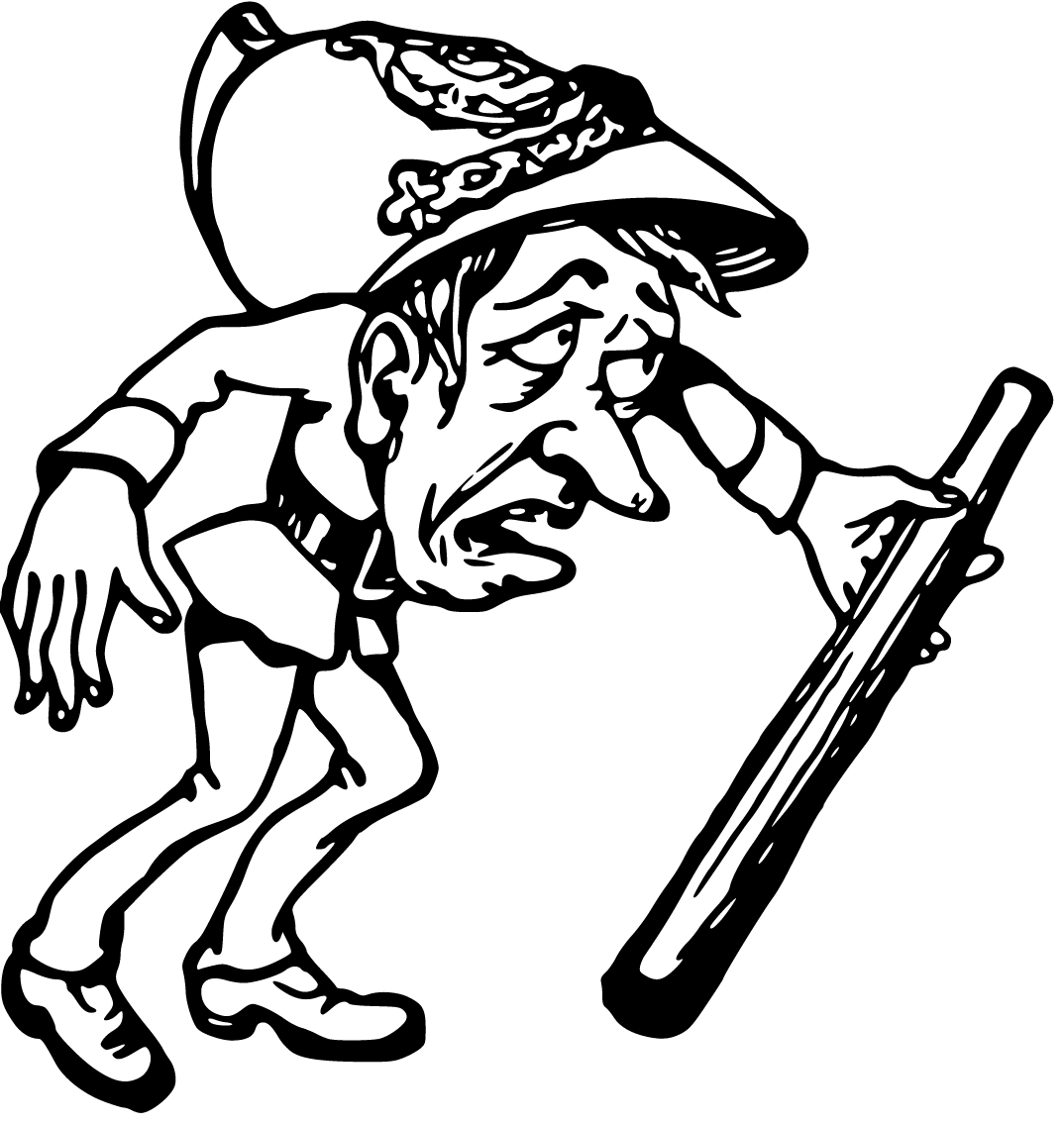
Another club case came before Bailie Brown in Edinburgh Police Court yesterday, in which three men, named William Stewart, 16 Murano Place; James Robb, Canon Street; and Patrick M’Louchlin, were charged with trafficking in exciseable liquors in the premises known as the Excelsior Social Club, Dublin Mews, on Sunday, 5th October last. The accused pleaded not guilty, and were defended by Mr Crabb Watt, advocate.
The Fiscal at the outset stated that the case was continued for trial until yesterday. The Bailie would remember that on Wednesday a point came before the Court in a similar charge with regard to the evidence that a constable had given in the witness box. The Bailie took that point into consideration, and the case was practically stopped when the evidence for the prosecution had been led. That case had been continued till Saturday. The Fiscal did not think that he would be justified in going on with yesterday’s case until the decision of Saturday was known. He proposed to ask for a continuation until some day next week. Mr Watt objected to any continuation, and the Bailie ordered the case to proceed.
The first witness was Constable John Gannon, and in answer to the Fiscal he spoke to visiting the club and being served with various quantities of liquor by the accused on the day in question.[4] Cross-examined, the witness said he went to the club on the instructions of Inspector Moodie. He had money, but did not get it from Inspector Moodie. He understood it would be refunded.
Their visit to that club was at 7.30 in the evening, and the other clubs were visited in the morning. He was accompanied by Constable Merson. Asked if he had a conversation with Robb, the witness said he thought he had. Q.—Did you tell him that you belonged to Dublin, and were a member of the Scottish Horse, and did Robb remark that it was a funny thing for an Irishman to be a member of the Scottish Horse? A.—I don’t remember.
The witness admitted that Inspector Moodie and Sergeant Allan were waiting on the result of his visit. Q.—Have you been the worse of liquor on duty lately? A.—No. The Fiscal objected to the question, as he thought it had no bearing on the case. Mr Watt said it was with the object of testing the credibility of the witness. The Bailie—Put your question again. Q.—Were you, Gannon, before the Chief-Constable last week for drinking while on duty in the Castle Hotel? A.—Yes. I think, however, you should go to the Chief-Constable for my character, and not bring in such things in Court. The witness was then subjected to a long cross-examination as to his connection with the Leith Working Man’s Club, and also as to his evidence given in a similar case on Wednesday.
Constable Merson corroborated the previous witness as to what took place in the club. Lieutenant Moodie and Sergeant Allan spoke to the first two witnesses reporting to them what took place in the club. The case for the prosecution was then closed.
For the defence the accused M’Louchlin admitted having seen Gannon. Gannon asked him to get a drink. He said he belonged to Dublin, and was a member of the Scottish Horse, having just returned from South Africa, and had plenty of money.[5]
ln cross-examination the witness said that the club was formed, among other things, to provide recreation for its members. Asked what kind of recreation they had, the witness said they had plenty of books to read. The Fiscal—Do the members read them quietly on a Sunday morning? A.—I never heard them making a noise. The Fiscal—I have. The Bailie—Personally? The Fiscal—Yes, I live near at hand.[6] (Laughter.) The witness subsequently admitted that in taking Gannon into the club he was infringing the rules of the club. It was the first time that the rules were infringed.
James Robb, the second accused, said he thought he would be expelled for breaking the rules of the club, in fact, he deserved to be. The Fiscal–There are a great many of the club people who have not yet had their deserts. (Laughter.) Mr Watt—The Fiscal, from his line of examination, seems to live very near this club. He is so revealing his esoteric knowledge that I think he should be put into the witness-box, so that I might have an opportunity of examining him. (Laughter.)
The third accused, William Stewart, said that the police had remarked of their club that it was the best conducted club in Edinburgh, and had the most respectable members.
Mr J. Robertson, solicitor, was then examined. He stated that he represented two men charged with a similar offence, who were tried on Tuesday. In the course of cross-examination of the witness Gannon, he asked if he had ever been a member of a working man’ s club, or if he had ever been a member of the Leith Working- Man’s Club. To these questions Gannon answered ‘No.’ On the following day Cannon explained that the questions took him by surprise, and were put very suddenly. The witness, however, said he put the questions deliberately, and that Gannon answered them in the same manner as the other questions. This closed the evidence. The Fiscal then addressed the Bench.
Mr Watt, in his address, referred to the evidence given by Constable Gannon. That man came before the Court that day with a fresh complaint against him, as he admitted that he was before the Chief-Constable last week for drinking while on duty. It had also been proved by Mr Robertson that he had perjured himself, and he (Mr Watt) thought that the Bailie could not attach one tittle of weight to the evidence of such a man. He did not think that the prosecution had succeeded in their case, based as it was on the evidence of Constable Merson only. The evidence of that witness was only a dim, feeble, innocent echo of what the great Gannon had said. (Laughter.) The Bailie delayed judgment till Monday.[7]
Scotsman, 17 October 1902
[4] An article in EEN the previous day reported Gannon saying he had obtained ‘two pints of beer and two glasses of whisky, for which he paid M’Louchlin ls 3d. Later witness got a pint of beer and two glasses of whisky and a bottle of beer from Robb, and a half-mutchkin of whisky from Stewart, paying the former ls 2d and the latter 1s 5d.’ DSL gives ‘mutchkin’ as ‘A measure of capacity for liquids or for powdery or granulated solids = approx. 26 cu. ins. or ¼ pint Scots, i.e. ¾ pint imperial. Gen.Sc. Sometimes loosely used to translate pint (imperial), esp. for spirits’ [https://www.dsl.ac.uk/entry/snd/mutchkin], last accessed 26.11.20. Gannon is also reported in the EEN article as saying the Chief Constable had decided to take action against Edinburgh clubs after recent Sunday incidences in them of robbery and assault.
[5] The Second Boer War lasted from 11.10.99 to 31.5.02. Two Yeomanry regiments of the Scottish Horse arrived back in Britain in August, and were disbanded at Edinburgh Castle on 1 September.
[6] ELPOD (1902–03) gives R. Macaulay Smith, M.A., LL.B., advocate, public prosecutor, living at 28 Dublin St.
[8] Image: creative commons, last accessed 11.12.20.
*****
The Crusade Against Edinburgh Clubs.—
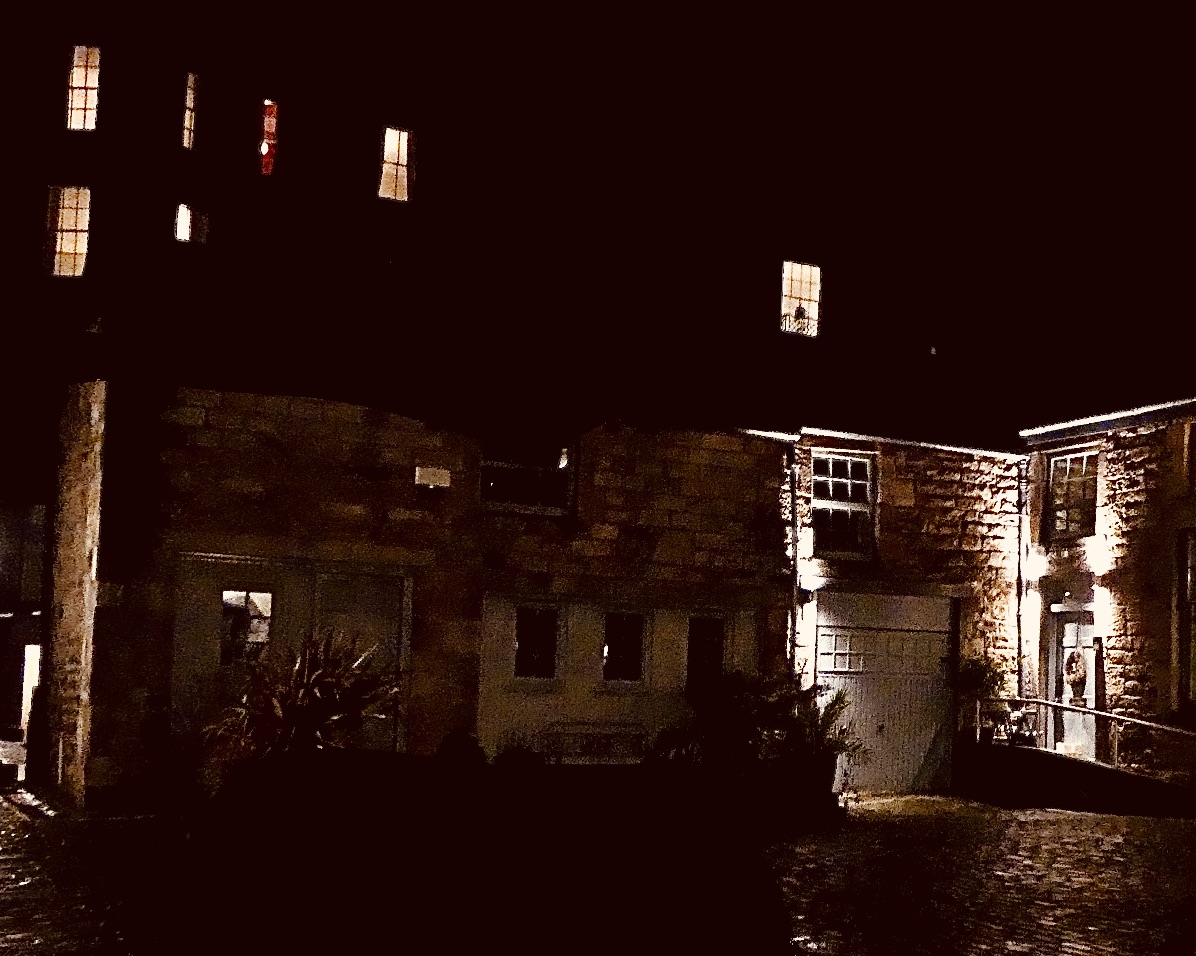
Bailie Brown, in Edinburgh Police Court on Saturday, gave his decision in other two club cases, the evidence in which he heard some time ago.
In the case of John Taylor, residing in St Patrick Square, and James M’Gindle, Grassmarket, who were charged with trafficking in exciseable liquors in the Gaiety Social Club, the Magistrate found the charge against Taylor not proven. The accused M’Gindle failed to appear, and a warrant was granted for his apprehension.
The next case dealt with was that against William Stewart, 16 Murano Place; James Robb, Canon Street; and Patrick M’Loughlin,27 Clyde Street. In this case the accused were charged with trafficking in exciseable liquor in the premises in Dublin Mews, Edinburgh, known as the Excelsior Social Club.
The charge against Stewart was found not proven, while Robb and M’Loughlin were convicted, and each fined £7 or six weeks’ imprisonment, and in addition £1 of expenses.
Scotsman, 27 October 1902
